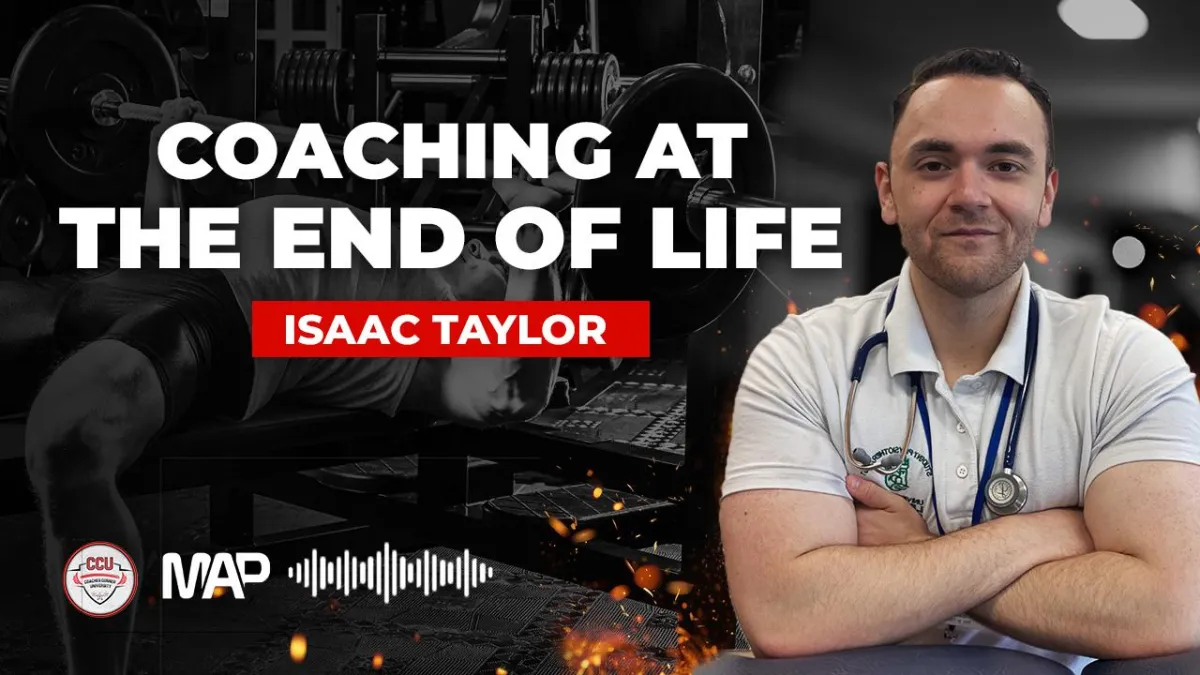Discover The Latest Blogs
Stay updated with Our Informative Blog Posts

CCU Podcast - Coaching at the End of Life with Isaac Taylor
Coaching at the End of Life
This week, I sat down with Isaac Taylor. Isaac is a former powerlifter and strength and conditioning coach who transitioned from the world of performance and fitness into healthcare. Now a practicing physical therapist, he specializes in cancer rehabilitation and palliative care, blending his background in strength training with a commitment to improving the quality of life for patients facing serious illnesses.
Isaac's journey from training athletes to supporting patients in their final months of life offers strength and conditioning professionals a unique perspective on what truly effective coaching looks like when the stakes are highest and pretense falls away.
10 Key Takeaways from Coaching at the End of Life
True Coaching Begins When You Stop Imposing Your Goals
Isaac's most striking revelation centers on the fundamental shift from rehabilitation-focused practice to patient-driven care: "I don't go in with any goals. I don't go in with any pretense, any preconceived notions. It's just, what do you want to do?" This approach directly challenges the conventional strength and conditioning model, where coaches often enter relationships with predetermined outcomes. Isaac learned that authentic coaching emerges when practitioners abandon their agenda and genuinely discover what drives the individual in front of them.
Master the Art of Information Gathering Through Active Listening
The distinction between "listening to respond versus listening with the goal of understanding" represents a fundamental coaching competency that Isaac identified as critically underdeveloped across both healthcare and fitness professions. He observed that most practitioners "are satisfied when they've heard what they want to hear, not what the patient or client in front of them wants to say." This passive approach to information gathering creates superficial coaching relationships and missed opportunities for meaningful intervention.
Question Everything: Normal Versus Normalized
Isaac's experience revealed how clients often mistake "normalized" conditions for "normal" ones, leading to incomplete assessments and suboptimal outcomes. Whether discussing digestive health, menstrual cycles, or movement patterns, Isaac learned that qualifying questions uncover critical information that surface-level inquiries miss entirely. This principle extends beyond physical assessment into understanding client motivations, barriers, and actual desired outcomes.
Establish Clear Professional Boundaries to Preserve Coaching Effectiveness
Working with terminally ill patients taught Isaac the essential skill of maintaining empathetic connection while protecting professional boundaries. He learned to "allow myself to be very empathetic... but at the same time, I can't allow myself to cross a boundary where I'm thinking about this a lot." This boundary management prevents coach burnout while ensuring each client receives optimal attention and care.
Embrace Client Agency as the Foundation of Success
Isaac's palliative care experience reinforced that "their baggage is not yours to carry" and that removing client agency by taking on their challenges ultimately hinders progress. He discovered that maintaining client autonomy, even in end-of-life scenarios, remained paramount to any meaningful intervention. This principle applies directly to strength and conditioning, where coaches must resist the urge to solve every client problem while supporting their journey toward self-efficacy.
Authenticity Emerges When Purpose Aligns with Practice
The transformation Isaac experienced moving from athletic performance coaching to palliative care illustrated how authenticity develops when practitioners align with their deeper purpose. He noted feeling like he was "fitting into his clothes" for the first time, describing how "as we get closer to our purpose, that shit all falls by the wayside." This alignment allows coaches to present their genuine selves rather than performing a professional persona.
Adopt a "Come As You Are" Mentality
Isaac's reading of "Behave" by Robert Sapolsky fundamentally shifted his perspective on client presentation and behaviour. Understanding that decades of experiences shape how individuals show up in coaching relationships, he developed a non-judgmental approach: "However people are with me, it is what it is. I don't blame them for the way they're acting." This perspective creates space for genuine connection and reduces defensive client responses.
Learn from Adjacent Professions Through Parallel Thinking
Isaac emphasized that "some of the best learning I ever did was not from other physiotherapists. It's from occupational therapists, it's from coaches, it's from physicians." This cross-pollination of ideas and approaches from related fields enhances coaching effectiveness by introducing fresh perspectives and methodologies that pure strength and conditioning education might miss.
Regulate Your Own Energy to Serve Others Effectively
The demanding nature of palliative care taught Isaac crucial lessons about energy management and emotional regulation that apply directly to strength and conditioning coaching. Working with multiple clients facing significant challenges requires practitioners to maintain their own emotional equilibrium while remaining genuinely present and supportive for each individual interaction.
Recognize That Vulnerability Creates the Deepest Coaching Opportunities
Isaac's observation that working with terminally ill patients provided more meaningful impact than any athletic achievement highlights how vulnerability opens doors to transformative coaching relationships. While strength and conditioning coaches may not work with life-threatening conditions, recognizing and honouring client vulnerability around body image, performance anxiety, or life transitions creates opportunities for profound positive impact.
Isaac's journey from athletic performance coaching to palliative care offers strength and conditioning professionals a masterclass in human-centred coaching philosophy. His experiences remind us that beneath every training goal lies a human being seeking connection, understanding, and support in achieving what matters most to them.
Find Isaac
Email - [email protected]
Instagram - @isaactayor97
Find the Podcast

Coaches Corner PhD




